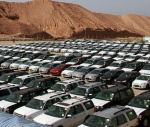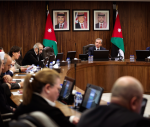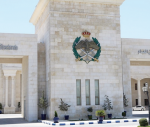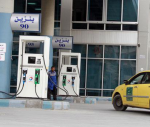You are here
The impact of student protests on Biden’s reelect
May 06,2024 - Last updated at May 06,2024
University student protests against US support for Israel’s war in Gaza have spread like wildfire. At last count, over 200 campuses have seen sustained demonstrations. Students have recently established protest encampments on some campuses, beginning last week at Columbia University in New York. Ten days later almost four dozen universities had encampments.
What has been most striking is not only how this effort has spread, but also the amazing diversity of the students involved, with Arab Americans joined by those of every race and creed.
The student leadership has been disciplined and eloquent in their demands for a ceasefire and an end to the genocide in Gaza. Many have also called on their universities to divest funds from entities contributing to the Israeli war effort.
Respected observers have noted that the protesters have been peaceful and orderly, if purposefully disruptive, at times occupying central campus locations and chanting (as demonstrators are wont to do).
Republican congressional leadership and a few pro-Israel Jewish organisations have painted these demonstrations as antisemitic and a threat to Jewish students’ safety. Exploiting it as a wedge issue, the members of Congress have portrayed protesting students as liberal elites, captive to anti-Israel groups. They have also repeatedly labelled chants used by some students as inherently antisemitic, saying, “from the river to the sea, Palestine will be free” calls for genocide against Jews in Israel. These deliberately distorted interpretations have been used to pressure some university presidents to resign and make life uncomfortable for others.
What has been ignored is that in many encampments a disproportionately large number of the protesters are Jewish students. Ironically, while one Jewish leader advised Columbia’s Jewish students to stay home for their safety and urged New York’s governor to call in National Guard units to restore order on campus, the encampment’s Jewish students were holding an interfaith Passover Seder.
Later, New York City police disbanded the encampment. In similar police actions in Texas, California, and Georgia, disturbing levels of violence (tear gas, rubber bullets, tasers, and baton beatings) were used against peaceful protestors.
Instead of dampening the student protests, actions by police, elected officials, and university administrators have hardened protesters’ resolve. The day after encampments were forcibly disbanded, students returned, reestablishing their protest sites.
With the students’ ire directed at both Israel’s genocidal behaviors in Gaza and the Biden administration’s continued enabling of this war, all this does not bode well for the president’s reelection.
Comparisons to the 1968 anti-Vietnam war protests and their role in costing Democrats the presidency are apt. As a participant in the protest politics both then and now, I attest to the similarities, as well as some important differences.
Vietnam was the first televised war, bringing the impact of napalm on civilians and the use of torture against prisoners into American homes. Opposition to the war was rooted in moral or political reasons and the more personal concern with the national draft, requiring young people to register for military service.
Many protest movements emerged during the Vietnam era (civil rights, environmental concerns, women’s rights, etc.) but with limited overlap in participation.
Today is different, with significant overlap in the movements for women’s rights, Black empowerment, environmental justice and now opposition to Israel’s war in Gaza. With social media, today’s young people, whom my brother John Zogby calls “the first globals”, are experiencing the war in Gaza non-stop, and are deeply disturbed by what they’re seeing.
In the 1960s no Vietnamese students were on campuses, but today empowered and organised Arab American and progressive American Jewish students are mobilising opposition to Israel’s Gaza war with allies from other movements in which they participated.
Yet, the Biden White House has demonstrated only limited concern, dismissing polls showing the President losing support among young and “minority” voters. As primary elections in several states have demonstrated, the President is hemorrhaging support, and as repression against student demonstrators continues, that opposition is solidifying.
Should the war continue for several more months and if the scene at this summer’s Democratic Convention in Chicago is as ugly as 1968, many young voters will be hard pressed to vote for Mr Biden. They will not vote for Trump, but for a third party or not at all.
The writer is president of the Washington-based Arab American Institute














Add new comment